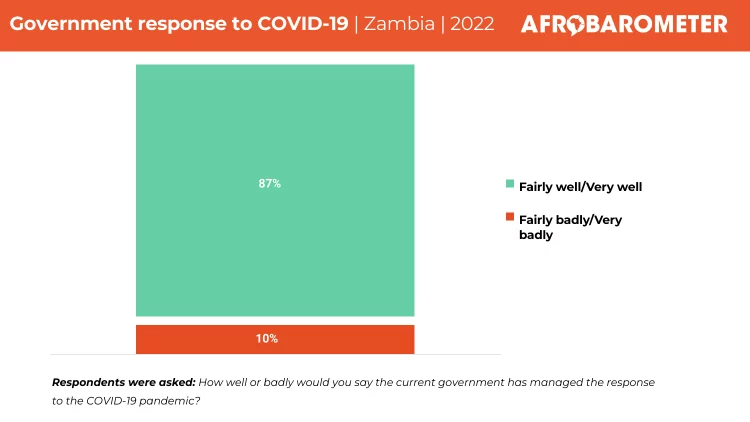Zambians Praise Government’s COVID-19 Response but Express Concerns Over Corruption
Zambians commend the government’s handling of the COVID-19 pandemic but voice widespread concerns about alleged corruption in the allocation of resources, particularly in relief assistance, according to findings from the latest Afrobarometer survey.
In response to the first confirmed COVID-19 case on 18th March 2020, Zambia implemented stringent measures, including school closures, restrictions on public gatherings, and a mass vaccination campaign that saw 70% of eligible citizens partially or fully vaccinated by early November 2022. However, these measures took a toll on the already fragile economy, leading to job losses and economic contraction.
The government’s efforts to mitigate the economic impact focused primarily on liquidity easing and tax relief for the mining sector. Still, according to the Afrobarometer survey, over a quarter of Zambians reported a household member losing a job or primary income source due to the pandemic.
While the majority of respondents expressed satisfaction with the government’s overall COVID-19 response and reported compliance with the vaccination campaign, sentiments were less positive regarding relief efforts. Many Zambians believe that resources allocated for COVID-19 relief were marred by corruption, leading to an unfair distribution of assistance.
Despite these concerns, the survey indicates that most Zambians believe their government is adequately prepared for future health emergencies. The Afrobarometer findings shed light on the complex dynamics between public perception, government actions, and the economic fallout from the global health crisis.
As Zambia navigates the aftermath of the pandemic, the challenge for the government lies in addressing the economic repercussions while ensuring transparency and accountability in the allocation of resources. The public’s faith in the government’s ability to handle future health emergencies provides an opportunity for building resilience and preparedness.



